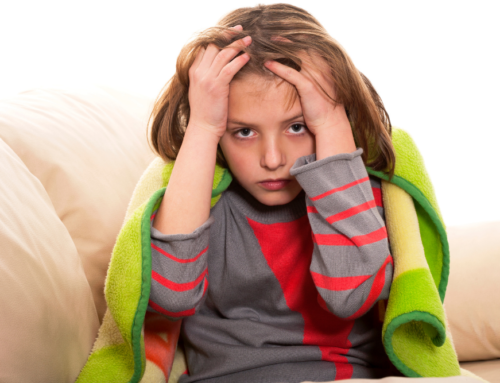 Article written by: Jennifer Welton, MA, MS, LPCC
Article written by: Jennifer Welton, MA, MS, LPCC
Here we are at six months into the COVID-19 pandemic and we’re still trying to manage so much uncertainty. Parents, whether your child has started school in-person, online or the hybrid model, just remember that nothing is easy for anyone right now. It can be especially difficult if you’re a parent struggling with anxiety, depression or other conditions that require medical intervention. If you are having difficulty, then your child might be exhibiting social, emotional and behavioral problems, too. When we are experiencing difficult emotional states, we may go into fight, flight or freeze mode. It’s our brain’s survival reaction to highly stressful situations. As a mental health consultant, I am recommending a “sit” mode. It might look like “freeze,” but it includes staying with your or your child’s emotional state and feeling any emotions that are coming up in the present, because those are valid too.
First, we will work on sitting while we examine what is creating immediate stress within your/our family circle. Here are some things to do at home with your child to alleviate some of the complicated stress affecting you and your child.
- Observe and read your own and your child’s social-emotional state. Adopt the “sit” response by slowing down your reaction to your child’s emotional cues and just sit with your child to quietly observe in the moment as you both self-regulate and calm.
- Reign in your “future thinking:” Stop being the doomsday parent. All the overthinking in the world won’t change what is currently happening in the world. Remember that almost every child in any school all over the world is going through something similar. Read here about how two kindergarten classrooms are handling their day.
- Relax your expectations but do your best to maintain routines: Make the simple activities of daily living enjoyable: Check out this dad’s grooming ideas, and watch how to motivate young children to clean-up. Developmentally appropriate chores, or as I like to call them “contributions to the household” help build self-efficacy and respect.
Now on to unraveling the bigger social connection threads as we seem to be stuck in crisis mode knots. Here are some images to keep in mind as you go out into the world each day. Try to find comfort in these reframes when you’re feeling stress.
Find our common thread: Stress and anxiety were already a chronic problem pre-pandemic. So, one way to approach our new normal is to, well, “normalize” our fears. Thinking about the global pandemic as a common thread we all have to weave into our daily existence might help. Think of this, before you get angry at your child for a behavior that they don’t know how to control, look for that common thread and realize he/she is afraid just like you. The same grace goes for your child’s teacher, the grocery store cashier, your partner or spouse, we’re all experiencing the same stress together, but in different ways and at unexpected times.
Find your unique thread: Think about your own, and your child’s strengths. Are you calm and compassionate? Brave and resilient? Spiritual, prayerful or meditative? Perhaps you have complimentary strengths. Focus on ways to utilize your strengths during this uncertain time. Look for ways to weave your unique thread into daily life to lessen the fear that gives way to stress and anxiety.
Accept the worn-out thread: This may be the news that seems to play on repeat, the person in our family we don’t agree with, or whatever it is in your life that causes stress and anxiety to escalate. You may think it makes more sense to cut these people or things out of your life for good. While this may be the case, practicing acceptance could bring greater peace. Let’s go back to our common thread and practice radical acceptance. Holding on to that common thread that binds our humanity will help us to sit with the experience of empathy.
Now, I didn’t provide any quick fix to the stress involved in the 2020 back to school dilemma, but the hope is to increase our ability to better manage the common stress we are all feeling because whatever we adults are feeling and going through, our children are trying to make sense of it all too. Afterall, they’ve only been on this planet for a very short time.
When anxiety, depression and other emotional states become too debilitating for you or your child, it might be time to connect with a Mental Health Professional at Mountainland Pediatrics or a therapist at Community Reach Center.
About the Author:
Jennifer is a Mental Health Consultant with Community Reach Center. She is a Licensed  Professional Counselor Candidate with a Master of Science in Clinical Mental Health Counseling. Jennifer also has over ten years of experience in education and holds a Master of Arts in Educational Psychology. Before working for Community Reach Center, Jennifer worked for a behavioral health hospital in the Pediatric Inpatient, Intensive Outpatient and Partial Hospitalization units. Jennifer’s interests are mindfulness meditation and practicing self-compassion.
Professional Counselor Candidate with a Master of Science in Clinical Mental Health Counseling. Jennifer also has over ten years of experience in education and holds a Master of Arts in Educational Psychology. Before working for Community Reach Center, Jennifer worked for a behavioral health hospital in the Pediatric Inpatient, Intensive Outpatient and Partial Hospitalization units. Jennifer’s interests are mindfulness meditation and practicing self-compassion.



